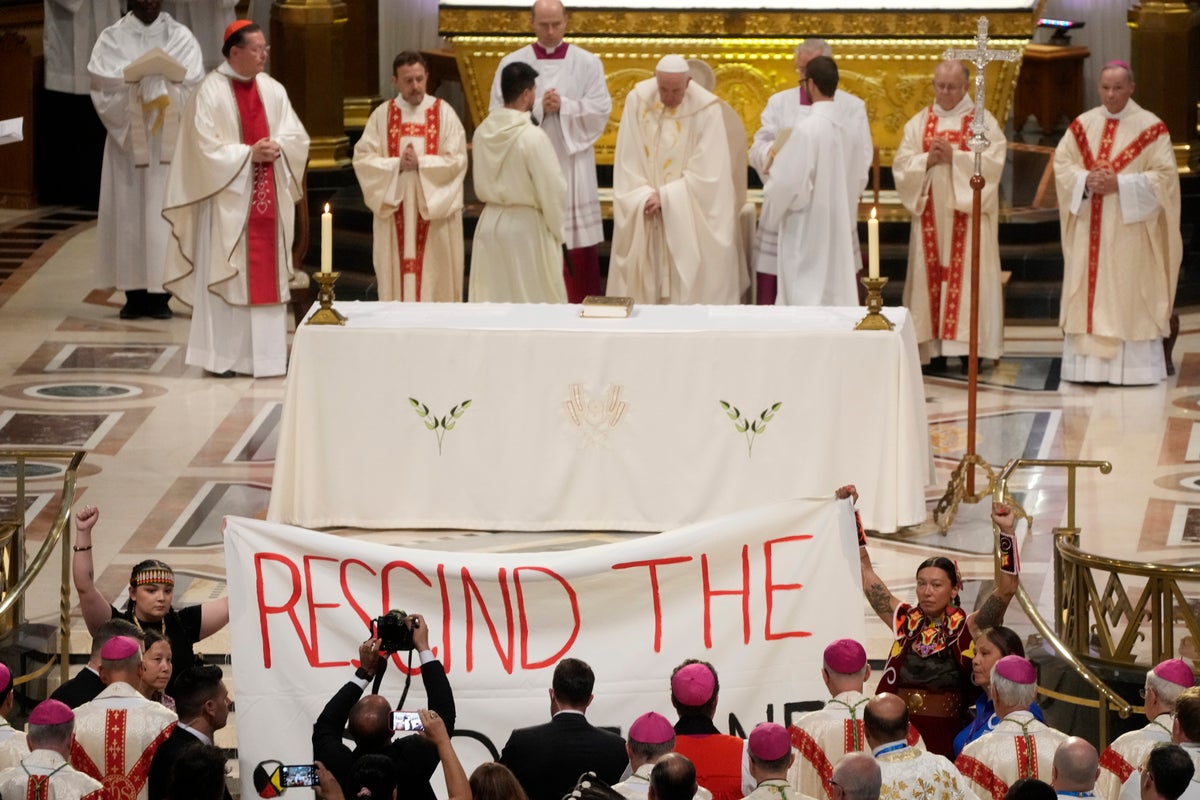
Pope Francis celebrated Mass on Thursday at Canada’s national shrine and came face-to-face with a long-standing demand from Indigenous peoples: to formally rescind the papal decrees underpinning the so-called “Doctrine of Discovery” that seemingly legitimized the colonial-era seizure of Native lands and resources.
Right before Mass began, protesters displayed a banner at the altar of the National Shrine of Sainte-Anne-de-Beaupré that read: “Rescind the Doctrine” in bright red and black letters. Security officers escorted the protesters away and the Mass proceeded without incident, though the banner was later draped outside the basilica.
The brief protest underscored one of the outstanding issues facing the Holy See following Francis’ historic apology for the Catholic Church’s involvement in Canada’s notorious residential schools, where generations of Indigenous peoples were forcibly removed from their families and cultures to assimilate them into Christian, Canadian society. Francis has spent the week in Canada seeking to atone for the trauma and suffering of First Nations, Metis and Inuit peoples.
Beyond the apology, Indigenous peoples have called on Francis to formally rescind the 15th century papal decrees, or bulls, that provided European kingdoms the religious backing to expand their territories for the sake of spreading Christianity. Those decrees have been seen as underpinning the Doctrine of Discovery, a legal doctrine coined in a 1823 U.S. Supreme Court decision that has come to be understood as meaning that ownership and sovereignty over land passed to Europeans because they “discovered” it.
Murray Sinclair, the First Nations chairman of Canada’s Truth and Reconciliation Commission, cited the doctrine in a statement this week welcoming Francis’ apology but calling on him to take responsibility for the full role of the church in the Canadian residential school system.
“Driven by the Doctrine of Discovery and other church beliefs and doctrines, Catholic leaders not only enabled the government of Canada, but pushed it even further in its work to commit cultural genocide of Indigenous peoples,” Sinclair said. “It was more than the work of a few bad actors — this was a concerted institutional effort to remove children from their families and cultures, all in the name of Christian supremacy,” he said in a statement this week.
Church officials have insisted those papal decrees have long since been rescinded or superseded by other ones fully recognizing the rights of Indigenous peoples to live on their lands, and say the original bulls have no legal or moral bearing today.
And Francis during the trip has reasserted repeatedly those rights and rejected the policies of assimilation that drove the residential school system, without referring though to his predecessors’ previous decrees legitimizing colonialism. But the issue remains a sore spot for Indigenous peoples who are seeking a current repudiation as part of the Holy See’s atonement for the role of Catholic religious orders in the residential school abuses.
Both the Vatican and Canadian trip organizers have confirmed that a new statement is being prepared, though it is not expected to be released during Francis’ visit.
“The Vatican has clarified that the papal bulls associated with the Doctrine of Discovery have no legal or moral authority in the Church,” Neil MacCarthy, in charge of communications for the papal visit, told The Associated Press in an email. “However, we understand the desire to name these texts, acknowledge their impact and renounce the concepts associated with them.”
Asked about the protest, MacCarthy said: "We recognize that there are very passionate feelings about a number of issues including the Doctrine of Discovery. The brief peaceful protest did not disrupt the service and the group had a chance to express their concerns.”
___
Winfield reported from Quebec City.







